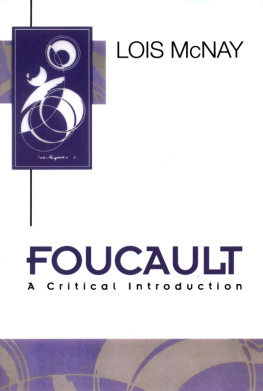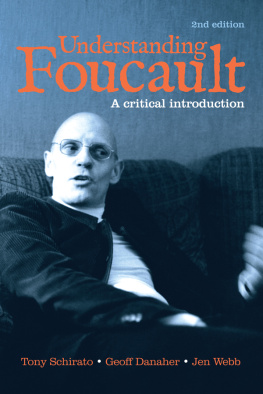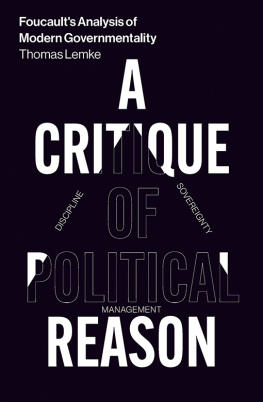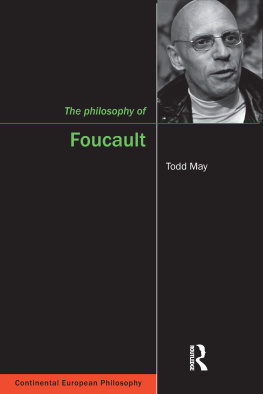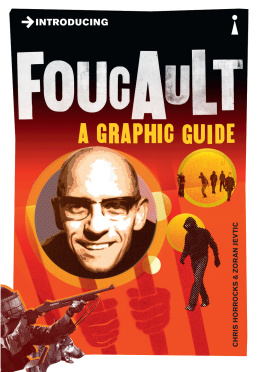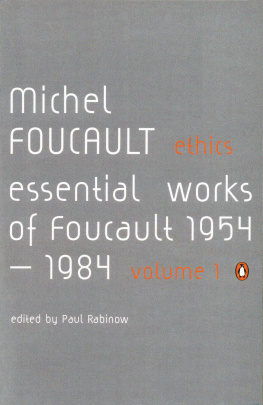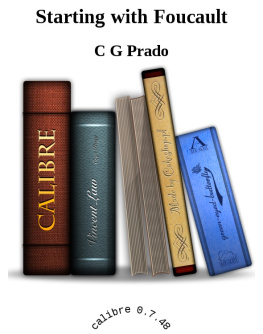
Key Contemporary Thinkers
Published
Peter Burke, The French Historical Revolution: The Annales School 19291989
Simon Evnine, Donald Davidson
Phillip Hansen, Hannah Arendt: Politics, History and Citizenship
Christopher Hookway, Quine: Language, Experience and Reality
Douglas Kellner, Jean Baudrillard: From Marxism to Postmodernism and Beyond
Chandran Kukathas and Philip Pettit, Rawls: A Theory of Justice and its Critics
Lois McNay, Foucault: A Critical Introduction
Philip Manning, Erving Goffman and Modern Sociology
Michael Moriarty, Roland Barthes
Georgia Warnke, Gadamer: Hermeneutics, Tradition and Reason
Jonathan Wolff, Robert Nozick: Property, Justice and the Minimal State
Forthcoming
Jeremy Ahearne, Michel de Certeau
Alison Ainley, Irigaray
Michael Best, Galbraith
Michael Caesar, Umberto Eco
James Carey, Innis and McLuhan
Colin Davis, Levinas
Eric Dunning, Norbert Elias
Jocelyn Dunphy, Paul Ricoeur
Judith Feher-Gurewich, Lacan
Kate and Edward Fullbrook, Simone de Beauvoir
Andrew Gamble, Hayek and the Market Order
Graeme Gilloch, Walter Benjamin
Adrian Hayes, Talcott Parsons and the Theory of Action
Christina Howells, Derrida
Simon Jarvis, Adorno
Paul Kelly, Ronald Dworkin
William Outhwaite, Habermas
Susan Sellers, Helene Cixous
Geoff Stokes, Popper: Politics, Epistemology and Method
Ian Whitehouse, Rorty
James Williams, Lyotard
FOUCAULT
A Critical Introduction
Lois McNay
Polity Press
Copyright Lois McNay 1994
The right of Lois McNay to be identified as author of this work has been asserted in accordance with the Copyright Designs and Patents Act 1988.
First published in 1994 by Polity Press in association with Blackwell Publishers Ltd
Reprinted 1996, 2003, 2005, 2007
Polity Press
65 Bridge Street
Cambridge CB2 1UR, UK
Polity Press
350 Main Street
Malden, MA 02148, USA
All rights reserved. Except for the quotation of short passages for the purposes of criticism and review, no part of this publication may be reproduced, stored in a retrievs system, or transmitted, in any form or by any means, electronic, mechanical, photocopying, recording or otherwise, without the prior permission of the publisher
Except in the United States of America, this book is sold subject to the condition that it shall not, by way of trade or otherwise, be lent, re-sold, hired out, or otherwise circulated without the publishers prior consent in any form of binding or cover other than that in which it is published and without a similar condition including this condition being imposed on the subsequent purchaser.
ISBN: 978-0-7456-6785-0 (Multi-user ebook)
A CIP catalogue record for this book is available from the British Library.
Typeset in 10 on 12 pt Palatino by Pure Tech Corporation, Pondicherry, India Printed and bound in Great Britain by Marston Book Services Limited, Oxford
This book is printed on acid-free paper.
For further information on Polity, visit our website: www.polity.co.uk
Contents
Acknowledgements
I would like to thank John Thompson for suggesting this project to me and for his comments on a late draft of the text. I am grateful to Desmond King and Ben Cairns for reading sections of the manuscript and to Andrew Coleman and Andy Davies for their encouragement and support. I am also grateful to St Johns College, Oxford, for financial assistance in the form of a Research Fellowship.
LoisMcNay
Introduction
The scope and sophistication of the thought of Michel Foucault is imposing. His work straddles the disciplines of philosophy, history, sociology and literary theory. He has written detailed histories of the development of psychology, of clinical medicine, of the birth of the asylum, of the modern penal system, and of Ancient Greek and Roman morals. He has also written extensively on modern literature and has produced a structural analysis of the development of Western thought since the Renaissance. These literary and historical studies are, in turn, informed by philosophical reflection on the nature of rationality, truth and power, and on what it means to be an individual in modern society.
The breadth and complexity of Foucaults work defies easy categorization and this has often led to certain difficulties in its critical reception. Historians have rejected Foucaults work for being too philosophical, philosophers for its lack of formal rigour and sociologists for its literary or poetic quality. It is this breadth and complexity that has resulted in what Maurice Blanchot has called both the difficult and privileged position of Foucaults work in relation to twentieth-century thought: do we know who he is, since he doesnt call himself either a sociologist or a historian or a structuralist or a thinker or a metaphysician? Despite its impossibility, the desire to know who Foucault the thinker is has generated an enormous amount of secondary literature. With regard to the aims of this book, there already exist many excellent introductions to Foucaults work. The justification for yet another critical overview is that most of the existing introductions do not include a sustained consideration of Foucaults final work on the themes of government and the self. My objective is to fill this gap.
The ideas of government and the self encapsulate Foucaults final thought on two major themes that run throughout his work, those of power and the subject. Indeed, it is probably these two themes that are the most well-known aspects of Foucaults thought in so far as it is linked to the proclamation of the death of the subject and to the idea that all knowledge is ineluctably embedded in power relations: power-knowledge. It is the development of these two themes of the addition of the idea of government to the theory of power and of the move from a problematization of the subject to the idea of an ethics of the self that forms the guiding thread of this introduction to Foucaults work.
Throughout his work, the development and reformulation of a concept of power remains a constant preoccupation of Foucaults. Partly in explicit counterposition to a Marxist perspective, Foucaults interest was not directed at the expression of power in its most central and institutionalized forms such as state apparatuses or class relations. Rather, he was concerned to examine how power relations of inequality and oppression are created and maintained in more subtle and diffuse ways through ostensibly humane and freely adopted social practices. In short, Foucault questions the rationality of post-Enlightenment society by focusing on the ways in which many of the enlightened practices of modernity progressively delimit rather than increase the freedom of individuals and, thereby, perpetuate social relations of inequality and oppression.
While the concern with uncovering the dark side of modernity remains the undiminished force informing Foucaults entire output, the conceptualization of power and its realization in social relations varied with the development of his thought. In his early work on madness, Foucault demonstrated how the apparently therapeutic practices of psychology, psychiatry and psychoanalysis were instrumental in depriving mad individuals of a voice by construing their disorders in the univocally negative language of mental illness. The mad are not listened to and hence are alienated from themselves because modern clinical practice effaces the specificity of each individual case through the imposition of archaizing and alien concepts. The model of power relations that Foucault worked with at this stage is, on his own account, an essentially negative one in which power is always expressed in strategies of repression and exclusion. No differentiation is made between forms of thought and institutional practices which become indistinguishable in the uniformity of their repressive effects on the social realm. This leads to a rather bleak view of the total bankruptcy of the Enlightenment legacy both in terms of the philosophical rationality and the processes of societal rationalization it unleashed.
Next page
